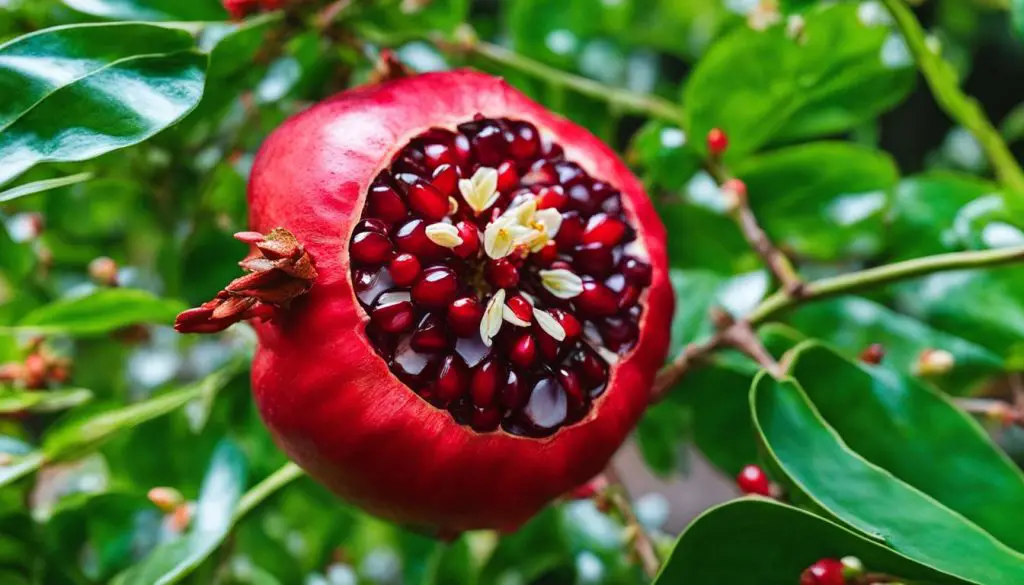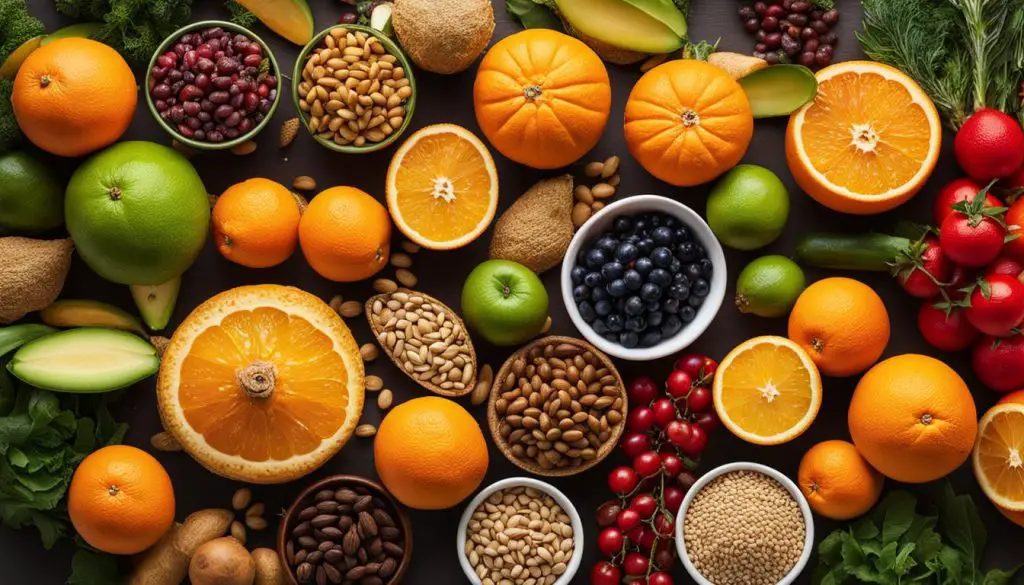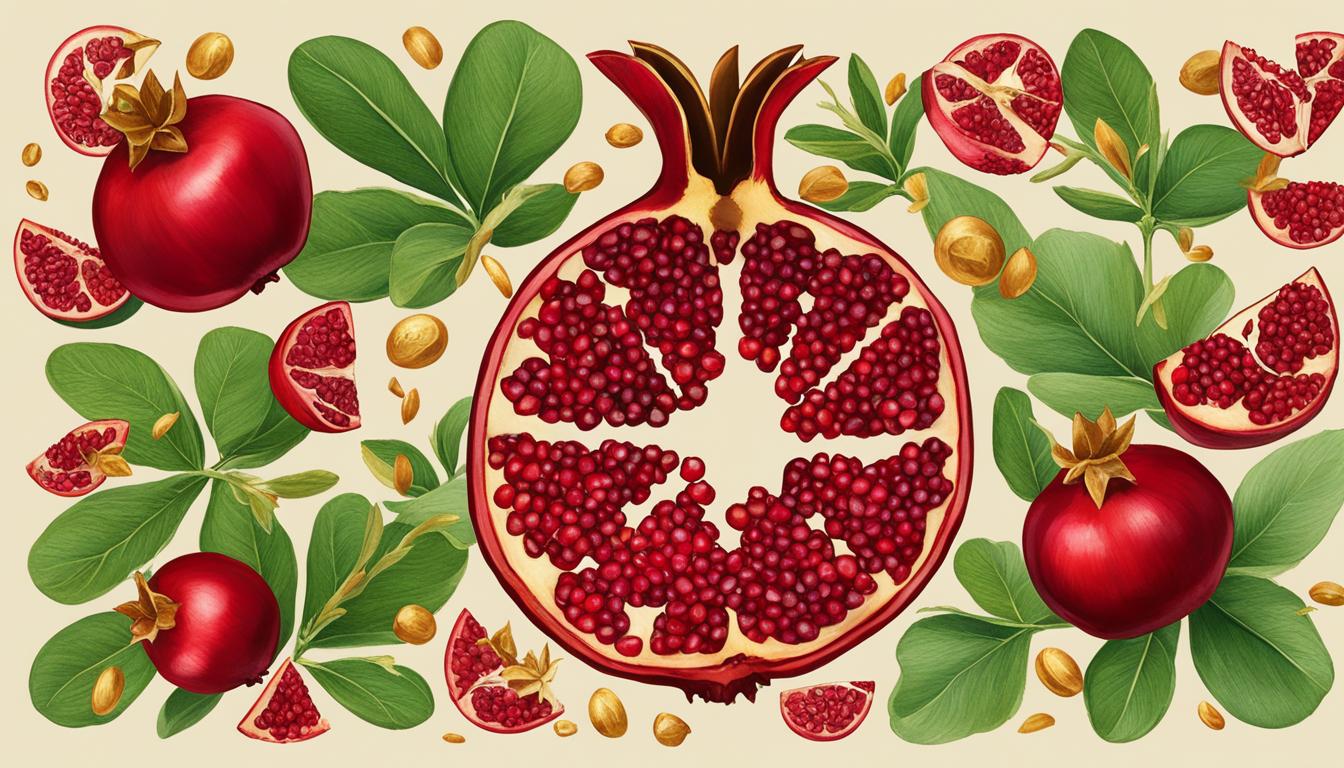As the New Year approaches, it’s time to embrace traditions and customs that are believed to bring luck and prosperity. One such tradition involves the pomegranate, a fruit with deep-rooted symbolism in various cultures. From ancient Greece to modern-day Brazil, the pomegranate has long been associated with good fortune and abundance. So, is the pomegranate truly a good luck fruit for the New Year?
Contents
- 1 Pomegranate in Greek New Year Traditions
- 2 Pomegranate in Other Cultures
- 3 Lucky Foods for the New Year
- 4 Incorporating Pomegranate Seeds into New Year’s Menus
- 5 Conclusion
- 6 FAQ
- 6.1 Is pomegranate considered a good luck fruit for the New Year?
- 6.2 How is pomegranate incorporated in Greek New Year traditions?
- 6.3 Are pomegranates considered lucky in other cultures?
- 6.4 What are some other lucky foods for the New Year?
- 6.5 How can you incorporate pomegranate seeds into New Year’s menus?
- 6.6 What are some other traditional lucky foods for the New Year?
- 6.7 What is the significance of pomegranates in New Year traditions?
- 7 Source Links
Key Takeaways:
- The pomegranate is considered a good luck fruit in many cultures for the New Year.
- In Greek traditions, opening a pomegranate symbolizes well-wishing for luck and abundance.
- Pomegranate seeds are commonly incorporated into New Year’s Eve menus for their festive color and symbolic power.
- Other cultures, like Brazil, also believe that pomegranate seeds bring financial prosperity and good luck.
- Embracing the pomegranate’s symbolism can add a festive touch to your New Year’s celebrations.
Pomegranate in Greek New Year Traditions
In many Greek homes, the pomegranate holds a special place in New Year traditions. Opening a pomegranate on the first day of the year is believed to bring good luck for the rest of the year. This custom is deeply rooted in Greek culture and is seen as a way to invite blessings and abundance into the household.
Not only is the pomegranate opened as a symbol of good luck, but it is also given as a gift to loved ones. These pomegranate gifts, often made of metal, glass, or other materials, represent “γούρι” or good luck for the new year. By sharing this fruit, Greeks express their hope for prosperity and success for those they care about.
The pomegranate’s significance in Greek traditions goes beyond luck. In Greek mythology, it was associated with fertility and rebirth. The fruit was believed to be the symbol of Hera, the queen of the gods, as well as Venus and Persephone. The myth of Persephone and the pomegranate emphasizes the fruit’s connection to the cycle of life and death, making it a powerful symbol in Greek culture.
The Symbolic Power of the Pomegranate
The pomegranate’s deep red color and abundance of seeds make it a fitting symbol for fertility, prosperity, and rebirth. Its association with Greek New Year traditions reflects the importance of these qualities in Greek culture. By incorporating pomegranates into their celebrations, Greeks embrace the fruit’s symbolic power and express their wishes for a fruitful and prosperous year ahead.
Pomegranate in Other Cultures
While pomegranate holds great significance in Greek New Year traditions, its symbolism extends beyond Greece. In various cultures around the world, pomegranate seeds carry important symbolic power and are associated with traditions and good luck.
In Brazil, for example, it is believed that consuming seven pomegranate seeds on New Year’s Day brings financial prosperity and good luck for the year ahead. The vibrant red seeds are seen as a representation of wealth and abundance, making them a popular choice for those looking to start the year with positive energy.
Similarly, in Middle Eastern cultures, pomegranate seeds are considered a symbol of life, fertility, and abundance. They are often enjoyed during the New Year festivities, as the fruit reaches its peak ripeness. Incorporating pomegranate seeds into dishes like salads, desserts, and even cocktails adds a touch of symbolism and delicious flavor to the celebrations.
Embracing the tradition of incorporating pomegranate seeds into New Year’s meals allows people from different cultures to connect with each other and celebrate the universal desire for luck and prosperity in the coming year.

Table: Pomegranate Symbolism in Different Cultures
| Culture | Symbolism |
|---|---|
| Greece | Luck, fertility, and rebirth |
| Brazil | Financial prosperity |
| Middle East | Life, fertility, and abundance |
Lucky Foods for the New Year
When it comes to celebrating the New Year, certain foods are believed to bring luck and prosperity. These lucky foods, steeped in tradition and symbolism, are enjoyed by people around the world to usher in good fortune for the coming year. So, if you’re looking to start the year off on a fortunate note, consider adding some of these lucky foods to your New Year’s menu.
Black-Eyed Peas
Black-eyed peas have long been associated with good luck and prosperity in Southern traditions. It is believed that eating black-eyed peas on New Year’s Day will bring financial success. Whether enjoyed in dishes like Hoppin’ John or as a side dish, black-eyed peas are a staple on many New Year’s menus.
Grapes
In Spain, eating 12 grapes at the stroke of midnight on New Year’s Eve is a cherished tradition. Each grape represents a month of the year, and it is believed that consuming them will bring good luck for each month ahead. This unique ritual is a fun and delicious way to welcome the New Year.
Lentils
Lentils, with their coin-like appearance, are believed to symbolize wealth and prosperity. It is a common tradition in many cultures to eat lentils on New Year’s Day to attract financial abundance. Whether incorporated into soups, stews, or side dishes, lentils are a nutritious and symbolic addition to any New Year’s feast.
Dumplings
In Chinese tradition, dumplings are considered lucky because they resemble pouches filled with money. These delectable treats are often enjoyed as part of the New Year’s meal to symbolize wealth and prosperity. Whether pan-fried or steamed, dumplings are a delicious way to embrace this lucky food tradition.
| Lucky Food | Symbolism |
|---|---|
| Black-Eyed Peas | Financial Success |
| Grapes | Good Luck for Each Month |
| Lentils | Wealth and Prosperity |
| Dumplings | Symbolic Wealth and Prosperity |
By incorporating these lucky foods into your New Year’s menu, you can embrace the traditions and symbolism associated with the holiday. Whether you choose to enjoy black-eyed peas for financial success, eat grapes for good luck, savor lentils for wealth, or relish dumplings for prosperity, these foods are sure to add a touch of luck to your celebrations. So, as you raise your glass to toast to the New Year, don’t forget to savor these delicious and auspicious dishes.
Incorporating Pomegranate Seeds into New Year’s Menus
Pomegranate seeds can add a festive touch to your New Year’s menus, whether you’re hosting a party or enjoying a cozy meal with loved ones. These vibrant, antioxidant-rich gems are not only delicious but also carry symbolic power. Here are some creative ways to incorporate pomegranate seeds into your celebratory dishes:
Cocktails:
Elevate your New Year’s Eve cocktails by adding a handful of pomegranate seeds. Their tart sweetness and vibrant color will bring a burst of flavor and visual appeal to your drinks. Try adding them to classic recipes like margaritas or create your own signature cocktail with a pomegranate twist.
Salads:
Pomegranate seeds are a delightful addition to salads, providing a burst of juiciness and a refreshing flavor. Pair them with leafy greens, goat cheese, and a tangy dressing for a vibrant and healthy start to the year. The combination of textures and flavors will make your salad a standout dish on the table.
Guacamole:
Add a festive touch to your guacamole by sprinkling pomegranate seeds on top. The tartness of the seeds complements the creamy avocado and tangy lime juice, creating a flavor explosion in every bite. Serve it with crispy tortilla chips for a crowd-pleasing appetizer that’s guaranteed to impress.

Alongside pomegranates, there are several other lucky foods that are enjoyed on New Year’s to bring good fortune and prosperity. These traditional dishes are believed to symbolize financial success and abundance for the upcoming year. Let’s explore some of these popular lucky foods:
Hoppin’ John
Hoppin’ John is a classic Southern dish made with black-eyed peas, rice, pork, and seasonings. This flavorful combination is believed to bring financial success and good luck. The black-eyed peas symbolize coins or wealth, while the pork signifies prosperity. Many families in the Southern United States enjoy Hoppin’ John on New Year’s Day as a way to start the year with luck and prosperity.
Texas Caviar
Texas Caviar is a cold dip made with various beans and vegetables, including black-eyed peas. It is a popular choice for New Year’s celebrations in Texas and beyond. This dish is not only delicious but also represents wealth and abundance. The black-eyed peas in Texas Caviar are believed to bring good luck and financial prosperity for the year ahead.
Salmon
In some cultures, eating salmon on New Year’s is considered lucky. Salmon is associated with progress and prosperity due to its ability to swim upstream against strong currents. It symbolizes perseverance and the ability to overcome challenges. Including salmon in your New Year’s menu is not only a delicious choice but also a way to embrace the luck and positivity that this fish represents.
Dumplings
Dumplings are considered lucky in Chinese tradition and are often enjoyed on New Year’s Day. These small pockets of dough filled with various ingredients symbolize wealth and abundance. The shape of the dumplings is said to resemble ancient Chinese currency, making them especially valuable in attracting good fortune for the coming year. Whether steamed, boiled, or fried, dumplings are a tasty and auspicious addition to any New Year’s feast.
Lentils
Lentils are commonly enjoyed on New Year’s Day in many cultures. These small legumes, reminiscent of coins, are believed to bring financial prosperity. By incorporating lentils into your New Year’s menu, you are symbolically attracting wealth and good fortune for the year ahead. From lentil soups to lentil salads, there are countless ways to enjoy this lucky food and start the year on a positive note.
| Lucky Food | Symbolism |
|---|---|
| Hoppin’ John | Financial success and prosperity |
| Texas Caviar | Wealth and abundance |
| Salmon | Progress and prosperity |
| Dumplings | Good luck and wealth |
| Lentils | Financial prosperity |
These lucky foods have been enjoyed for generations and are an integral part of New Year’s traditions around the world. By incorporating these symbolic dishes into your New Year’s celebrations, you are inviting luck, prosperity, and abundance into your life. Whether you choose to enjoy Hoppin’ John, Texas Caviar, salmon, dumplings, or lentils, these foods are sure to add a touch of tradition and good fortune to your New Year’s menu.
Conclusion
Pomegranates have long been regarded as a symbol of good luck, fertility, and rebirth in various traditions and cultures. Incorporating pomegranate seeds into your New Year’s menus adds a vibrant and festive touch while embracing the fruit’s symbolic power.
In addition to pomegranates, there are many other lucky foods that are enjoyed to bring luck and prosperity in the New Year. From black-eyed peas and grapes to lentils and dumplings, these foods hold cultural significance and are incorporated into traditional dishes around the world.
By embracing these New Year’s traditions and including symbolic foods in your celebrations, you can bring a sense of joy and hope as you start the year fresh. Whether it’s smashing open a pomegranate or indulging in a bowl of Hoppin’ John, these traditions are a way to connect with your heritage and welcome luck and abundance into your life.
So, as you gather with loved ones and raise a toast to the New Year, don’t forget to include pomegranates and other lucky foods on your menu. And may the symbolism and traditions associated with these foods bring you good fortune and a prosperous year ahead.
FAQ
Is pomegranate considered a good luck fruit for the New Year?
Yes, pomegranate is often associated with good luck and abundance in the New Year.
How is pomegranate incorporated in Greek New Year traditions?
In Greek traditions, it is customary to open a pomegranate on the first day of the New Year for good luck. Pomegranates are also often given as gifts, symbolizing good luck for the new year.
Are pomegranates considered lucky in other cultures?
Yes, in Brazil, eating pomegranate seeds on New Year’s is believed to bring financial prosperity and good luck. In the Middle East, pomegranate seeds are associated with life, fertility, and abundance.
What are some other lucky foods for the New Year?
Other lucky foods for the New Year include black-eyed peas, grapes, lentils, and dumplings.
Pomegranate seeds can be used as a garnish in cocktails, toppings for salads, or added to dishes like guacamole to add flavor and symbolism to your celebratory meals.
What are some other traditional lucky foods for the New Year?
Other traditional lucky foods for the New Year include Hoppin’ John, Texas Caviar, salmon, dumplings, and lentils.
What is the significance of pomegranates in New Year traditions?
Pomegranates have a long-standing association with good luck, fertility, and rebirth in various traditions and cultures. They are believed to bring luck and abundance in the New Year.






